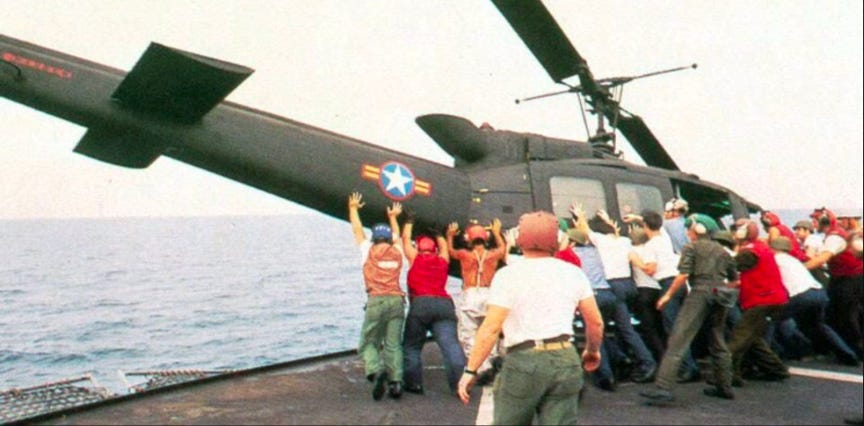Fifty years ago, as Saigon fell and the sky filled with desperate flight, Capt. Larry Chambers stood on the deck of the USS Midway and gave an order that defied command, protocol, and common sense. He told his men to push helicopters—tens of millions of dollars' worth—overboard into the South China Sea.
Why? Because above him, circling in a tiny Cessna, was a South Vietnamese pilot named Major Buang-Ly. With him were his wife and five children. They had no radio. No runway. Only a note dropped from the sky and a final sliver of hope.
Chambers made space.
That’s not just courage. That’s clarity. In a moment when everything was unraveling, he did not hesitate. He cleared the deck. And in doing so, he drew a quiet line between the machinery of war and the sanctity of human life.
In Saigon, Marine MPs were holding the line at the embassy gates. They were the last Americans on the ground. The last to leave. They followed no script. There was no textbook for what the end of a war looks like—only instincts, oaths, and the weight of duty. They stayed calm as the streets outside swelled with panic. They guarded the perimeter. Then they climbed aboard the final helicopter and watched their outpost vanish beneath them.
My father wasn’t in Saigon. He had come home years earlier. He served farther north, around Da Nang, when the illusion of progress was still intact. But on April 30, 1975, he watched the end on a television set in our home—watched the embassy rooftop, the final Huey lifting off, the city crumbling behind it.
He didn’t say a word.
In Reckoning, I tried to capture that moment—not with strings or sweeping brass, but with something more fragile. A piano tracing memory. A clarinet searching for resolution. And a celeste, gently pulsing like a second hand in an empty room. Time dissolving. Grief unspoken.
It’s not a movement of triumph or failure. It’s not political. It’s personal. It’s what silence sounds like when you’ve seen too much and still can’t find the words.
Today, in Vietnam, there will be fireworks—“Reunification Day,” the official story of victory. But in the hearts of those who fled, those who served, those who carry the ghosts of that war—today is not a celebration. It is a remembering.
We remember the Americans who disobeyed when it mattered. Who broke ranks to save a family. Who flew back again and again under fire to evacuate the forgotten. Who stood watch while the embassy emptied out. Who brought people home, or tried to.
And we remember those who came home too early to see the ending—but never really left it behind.
Fifty years later, the question still hangs: what did it mean? What was it all for?
Maybe the war was unwinnable. Maybe it was misguided from the start. But the individual acts of conscience, the moments of grace, the dignity carved from chaos—they meant something.
Listen to Reckoning (The Fall of Saigon) by Mark McInerney on #SoundCloud
https://on.soundcloud.com/aYfn1EpDMJbZvezC6






I remember the chaos of people leaving Saigon, helicopters on top of buildings, people on the roof. The hasty evacuation of Afghanistan reminded me of that time. Some Vietnamese interpreters and their families left behind were sent to "re-education" camps, as punishment. Wartime is brutal, during and after. Individual and group heroism does occur, though.